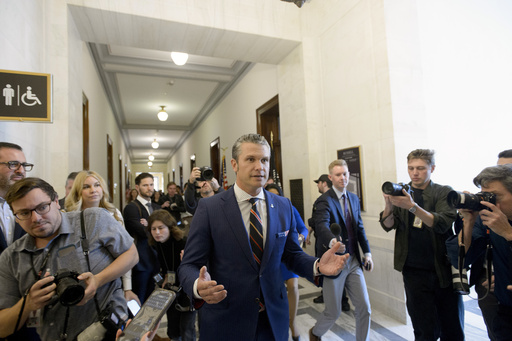
WASHINGTON — The team of President-elect Donald Trump has yet to formalize agreements necessary for initiating the transition to the White House. This delay hinders the government from providing security clearances, briefing sessions, and essential vetting processes for candidates for Cabinet and other critical positions. As a result, the FBI cannot conduct the necessary background screenings for Trump’s appointments.
The situation came into sharp focus on Thursday when former Florida Representative Matt Gaetz withdrew his nomination for attorney general due to ongoing scrutiny linked to a federal sex trafficking investigation, raising serious questions about his potential confirmation by the Senate. This pattern of delays may eventually necessitate Senate votes on Trump’s nominees without the standard background checks that typically serve to reveal any personal issues, criminal records, or other concerns that could affect an appointee’s fitness for important roles.
Moreover, experts on governance and the transition process have stressed that Trump’s reluctance to sign off on the necessary transition documents could obstruct many of his national security appointees from receiving the requisite clearances. As a result, this could leave the incoming administration unprepared to fulfill its governing duties on Inauguration Day, set for January 20, 2025.
Currently, the missing agreements include memorandums of understanding that outline cooperation between the incoming and outgoing administrations, specifically for background checks and the sharing of any negative findings by the FBI. These documents also encompass required ethics disclosures and restrictions on donor contributions. According to sources familiar with the transition discussions, the Trump team’s hesitation has largely stemmed from these compliance requirements.
Despite the delays, there is still an opportunity for the agreements to be finalized. A spokesperson from the Justice Department indicated that talks with the Trump transition team are ongoing. While the transition team did not comment directly, spokesperson Brian Hughes remarked earlier this month that their legal representatives are engaging constructively with officials from President Joe Biden’s outgoing administration.
In the absence of signed agreements, the Trump team has leaned on internal campaign aides, supportive organizations, and external law firms to assist in their appointments. Trump has historically been wary of the FBI, likely due to the investigation into Russian election interference during his first term and ongoing probes regarding classified document mishandling and attempts to challenge the outcomes of the 2020 election that resulted in his indictment last year.
During a standard transition, the new administration typically prepares to fill about 4,000 government positions appointed at the executive level, including roles requiring Senate confirmation. With the Senate set to shift to Republican control in January, GOP leaders plan to expedite confirmation hearings as soon as the new Congress gathers on January 3, enabling potential votes for nominees right from Inauguration Day. However, lawmakers have expressed concerns over the apparent lack of thorough vetting for the nominees put forth by Trump, prompting some congressional Republicans to voice apprehensions regarding misconduct allegations against several appointments.
Even though Gaetz is no longer a concern, he is not the sole Trump appointee facing scrutiny. Pete Hegseth, proposed for Secretary of Defense, faced sexual assault allegations in 2017 but was not charged post-investigation. Additionally, the choice of former Democratic Rep. Tulsi Gabbard for Director of National Intelligence has raised alarm bells among intelligence analysts due to her prior critical stance on Ukraine and interactions with Syrian President Bashar Assad, seen as a significant ally of Russia.
As it stands, the incoming administration lacks access to briefings and pertinent information from their outgoing counterparts, which could be vital for preparing for their new responsibilities. Also, Trump’s appointees needing security clearances cannot commence their roles without the mandated background checks. However, once in office, Trump could initiate security clearances at his discretion, as he reportedly did for his son-in-law Jared Kushner during his initial term.
It’s currently uncertain if this stalling will lead to any long-standing ramifications. The delay in transition may not pose significant issues, given Trump’s previous experience as president, which has likely equipped him with a more profound understanding of how to govern than he had in 2016.
Yet, historical instances provide a cautionary tale; the 9/11 Commission noted that the contested presidential election of 2000—which pushed back the transition between President Bill Clinton and President George W. Bush—created a security gap that could have left the U.S. inadequately prepared for the September 11 attacks. The commission’s 2004 report highlighted that the 36-day delay significantly hindered the new administration’s ability to identify, recruit, clear, and confirm key appointees in a timely manner.
